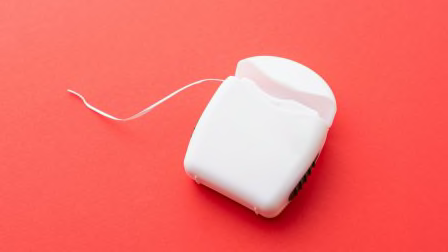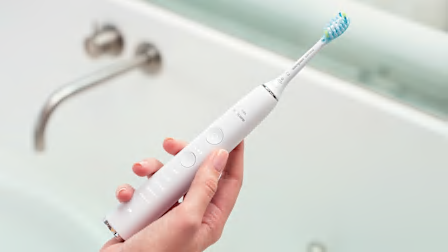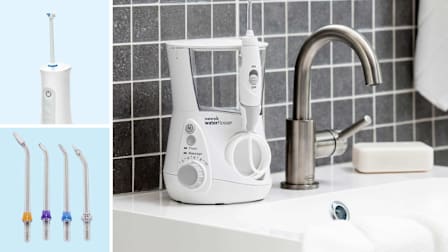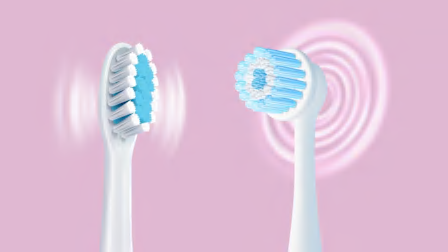How Well Do Water Flossers Like Waterpik Work?
Here’s how these devices compare with dental floss, and why cleaning between your teeth is so important
When you shop through retailer links on our site, we may earn affiliate commissions. 100% of the fees we collect are used to support our nonprofit mission. Learn more.
I haven’t had braces since ninth grade, but I still maintain one vestige of that painful period of orthodontia: a permanent retainer that’s fused to the back of my bottom front teeth. I try to be diligent about flossing, but when it comes to those six teeth, the retainer presents a special challenge. Threading special stiff floss between the gaps is tedious and difficult, and, more often than I should, I simply skip it.
Enter the water flosser, often known by the brand name Waterpik, which produces a pulsing, high-pressure jet of water to blast away food debris and plaque from teeth. These products promise to make things easier for people like me with oral hardware that makes string flossing difficult or for anyone who generally finds flossing to be a chore.
But do water flossers work as well as string floss? The evidence is mixed.
While regular dental floss remains the gold standard, it’s clear that water flossers can have some benefits, especially if they get you to floss more often or if you have dental implants, orthodontia, or a limited range of motion in your hands. Here’s what the scientific research suggests about their effectiveness, and why it’s important not to skip cleaning between your teeth.
The Evidence on Water Flossers
A number of studies have found that water flossing benefits oral health, though some of the research is a little thin, and much of it is sponsored by Waterpik or other water flosser manufacturers.
For example, in an email to CR, Waterpik pointed us to a small study demonstrating that its water flossers had the capacity to remove essentially all plaque from teeth. But this study was conducted on teeth that had been extracted and cut into slices, so they weren’t in a human jaw. Plus, the amount of plaque removal wasn’t directly compared with regular flossing.
Why Floss at All?
Your mouth may feel clean and fresh after you finish brushing your teeth, but pretty much the moment you stop, the bacteria in your mouth get busy rebuilding what your toothbrush destroyed.
Once you finish brushing, compounds in your saliva naturally adhere to the surface of your teeth, forming a coating called the pellicle. The pellicle is somewhat protective; it makes it more difficult for food to stick to your teeth, for example. But it’s also a natural home for bacteria, particularly the types that cause tooth decay. Bacteria quickly attach to and colonize the pellicle, says Edmond R. Hewlett, DDS, consumer adviser for the American Dental Association and a professor at the UCLA School of Dentistry in Los Angeles.
Thus, the rationale for cleaning your teeth and brushing away this film of bacteria every day. Without regular cleaning, that film “is going to stay there. And the longer it stays there, the more mature it becomes,” Hewlett says. The more mature it gets, the stickier and harder it becomes to remove, and it continues to produce “the acids that make cavities, and the other toxins that inflame the gums and lead to gum disease.”
Brushing effectively scrapes away this coating so that the bacteria must constantly start over from square one. But that only covers the surfaces your toothbrush can reach. To clear the saliva and bacteria between the teeth, you have to use another method—otherwise, they continue to build up largely undisturbed.
Should You Use a Water Flosser?
In Hewlett’s view, string floss that’s used correctly accomplishes the task of scraping away bacterial biofilm between teeth at least slightly better than a water flosser can. Water flossers are good at removing food and other debris from the surface of your teeth, he says. And they have some effect on the bacterial biofilm that causes decay. “The studies do indicate that [a water flosser] can disturb and can sort of disrupt the biofilm, and then for a period of time, the bacteria has to reorganize,” he says. But that’s still not quite as good as physically removing the layer of bacteria between your teeth, as you can with string floss.
Richardson agrees. The removal of plaque from teeth by string floss “is a vital component to an efficient daily home care regimen, as regular flossing can effectively remove plaque prior to the calcification process, which creates tartar and can lead to periodontitis [bone loss around teeth].”
That said, many people don’t floss daily or thoroughly, and some people don’t floss at all. If a water flosser is what gets you to consistently clean between your teeth, and you weren’t consistently flossing before, then Hewlett is all for it. “I would be thrilled, as a dentist, if someone used a water flosser every day,” he says.
Linda Cheng, DDS, MPH, a clinical associate professor at the Texas A&M University School of Dentistry, says she hopes people will consider using water flossers because she’s noticed that they often feel more enthusiastic about them than they do about dental floss. “Very recently, I’ve talked to my patients more about getting a Waterpik, and they’ve been more receptive to it than ‘I encourage you to floss,’ ” she says.
And water flossers may have advantages over string floss for many people. Those with orthodontia—whether that’s a measly permanent retainer like mine or a mouth full of braces—can benefit, because water flossing is likely to be easier than using string floss.
People with dental implants can also benefit from added attention to cleaning around them, Cheng says. “People need to realize that just because you have an implant and it’s all metal doesn’t mean you’ll have no problems with it,” she says. “If there’s still plaque around an implant, just like with a natural tooth, you’re going to end up with inflammation.” A water flosser can be useful in keeping the area around an implant clean.
And not everyone can use floss. Water flossers generally have large handles that are easier to grip and manipulate than string floss, Cheng says. For people with dexterity limitations, water flossing can be a useful tool for caring for their teeth.
There are other considerations as well. Some people may decide to use water flossers to avoid PFAS, a class of chemicals linked to potential human and environmental harm, that have been found in certain brands of dental floss.
Others may decide to stick with string floss because they’re already in the habit of using it. Plus, floss is effective and as cheap as a dollar a box. Water flossers are certainly pricier—Walmart has models ranging from about $20 to $160—but the devices should last for many uses and often come with a multiyear warranty.
@consumerreports It's vital to clean between your teeth. Here’s how water flossers compare with string floss. Learn more at cr.org/health 🦷 #healthtok #dentaltok #dentaltips #flossing
♬ original sound - Consumer Reports
CR's Recommended Toothbrushes
CR doesn’t currently rate water flossers, but here are a few top-rated electric toothbrushes from our tests. Digital and All Access members can also see all of our picks of the best electric toothbrushes.

